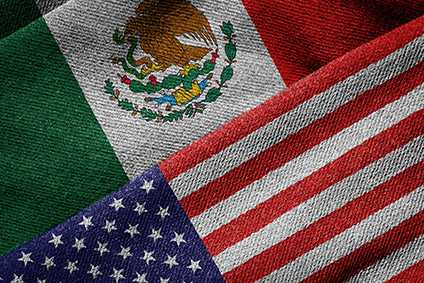
The US has reached a preliminary agreement regarding a new trade accord with Mexico that could replace the North American Free Trade Agreement (NAFTA), including stronger textile provisions than the original trade pact, and are designed to incentivise greater US and Mexican production in textiles and apparel trade.
The agreement was announced by President Donald Trump yesterday (27 August) during a conference call with his Mexican counterpart, Enrique Peña Nieto.
“It’s a big day for trade, a big day for our country,” President Trump said. “A lot of people thought we’d never get here because we all negotiate tough. We do, and so does Mexico.”
The US, Canada and Mexico have been working to renegotiate and modernise NAFTA since last summer, with the most recent round of talks held in Mexico City in March.
However, Trump was clear about his intentions to drop the name NAFTA from any new deal during yesterday’s call, claiming the 24-year-old trade pact has a “lot of bad connotations for the United States because it was a rip-off” and a “horrible deal” for the country.
See Also:
“We’re going to call it the United States-Mexico Trade Agreement, and we’ll get rid of the name NAFTA. It has a bad connotation because the United States was hurt very badly by NAFTA for many years. And now it’s a really good deal for both countries, and we look very much forward to it.”
How well do you really know your competitors?
Access the most comprehensive Company Profiles on the market, powered by GlobalData. Save hours of research. Gain competitive edge.

Thank you!
Your download email will arrive shortly
Not ready to buy yet? Download a free sample
We are confident about the unique quality of our Company Profiles. However, we want you to make the most beneficial decision for your business, so we offer a free sample that you can download by submitting the below form
By GlobalDataPena Nieto, meanwhile, said it is his wish that Canada would soon be incorporated in the revised agreement and he is “quite hopeful” that talks will soon begin between Canada and the US.
Trump confirmed negotiations with Canada will start shortly but warned the US will not stand for the country’s near 300% tariffs on some of its dairy products, adding he will propose a separate deal or incorporate any negotiations into the new agreement with Mexico.
Focus on textiles
A statement from the Office of the US Trade Representative (USTR) said the new agreement will create more balanced, reciprocal trade that supports high-paying jobs for Americans and grows the United States and Mexican economies.
It hailed a key achievement as strengthening supply chains to provide new market opportunities for the textile and apparel sector, adding the new provisions on textiles incentivise greater US and Mexican production in textiles and apparel trade, strengthen customs enforcement, and facilitate broader consultation and cooperation among the Parties on issues related to textiles and apparel trade.
According to USTR, the provisions will:
Promote greater use of Made-in-the-USA fibres, yarns, and fabrics by:
- Limiting rules that allow for some use of non-NAFTA inputs in textile and apparel trade.
- Requiring that sewing thread, pocketing fabric, narrow elastic bands, and coated fabric, when incorporated in apparel and other finished products, be made in the region for those finished products to qualify for trade benefits.
- Establish a Textiles chapter for United States-Mexico trade, including textile-specific verification and customs cooperation provisions that provide new tools for strengthening customs enforcement and preventing fraud and circumvention in this important sector.
“The new textiles chapter provisions are stronger than those in NAFTA 1.0 with respect to both enforcement and incentivising North American production of textiles,” said the USTR statement.
A “fair and reciprocal” agreement
Meanwhile, Vice President Mike Pence hailed the deal as “fair and reciprocal,” adding it will strengthen both nations’ economies.
“Today marks a new chapter between the United States and Mexico – one built around friendship, security, commerce, and prosperity. The US-Mexico Trade Agreement is a win for American ranchers, manufacturers, and auto workers,” he said. “Today is a win for the American people and we look forward to working with members of Congress in both parties to swiftly approve this new trade agreement.”
The deal was welcomed by US retailers as a step in the right direction, but there was concern regarding threats to pull out of the existing NAFTA agreement and proceeding without Canada.
“Coming to terms with Mexico is an encouraging sign, but threatening to pull out of the existing agreement is not,” said Matthew Shay, CEO of the National Retail Federation (NRF). “NAFTA supports millions of US jobs and provides hardworking American families access to more products at lower prices. To preserve these benefits and protect complex, sophisticated and efficient supply chains, the administration must bring Canada, an essential trading partner, back to the bargaining table and deliver a trilateral deal.”
Meanwhile, Rick Helfenbein, president and CEO of the American Apparel & Footwear Association (AAFA), welcomed the conclusion of bilateral talks with Mexico but emphasised the need for Canada to be a part of any final agreement.
“The conclusion of talks between the US and Mexico is a positive step in the NAFTA negotiations, however, it is essential that the updated agreement remain trilateral. At the same time, we encourage the administration to share the details of the agreement so the business community can inspect the impact on North American supply chains and share feedback with the administration and Congress.
“It is important to remember that the existing NAFTA works well for the apparel and footwear industry and its nearly 4m US workers, while at the same time providing real value to our US consumers. Any update to the agreement must continue to support these American jobs, promote trade linkages, and be seamlessly implemented to be considered a success. It is with this in mind that we are deeply concerned to hear any mention of withdrawal or termination of the existing agreement at this late stage.”







